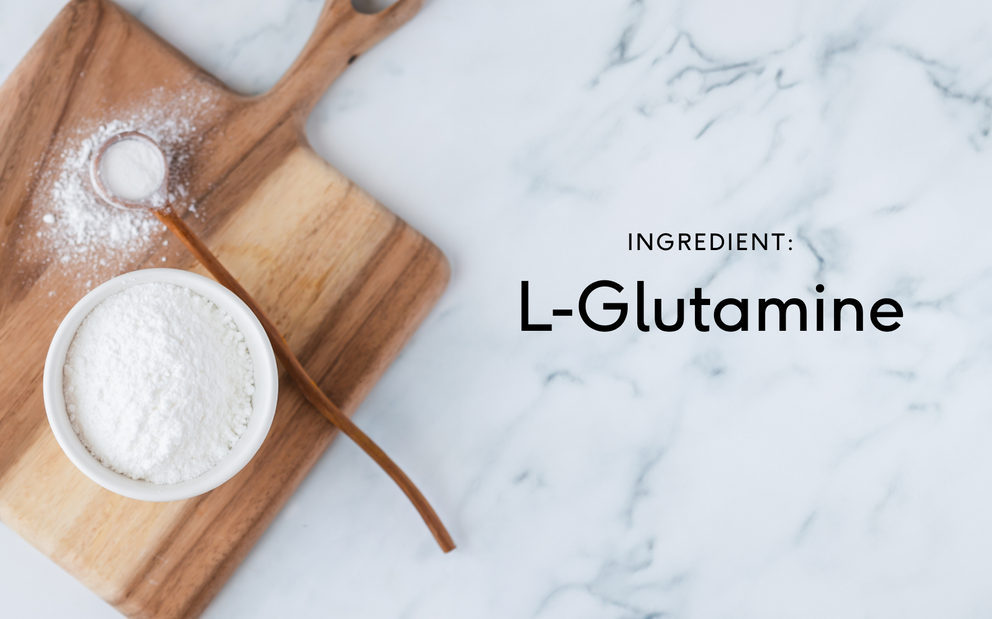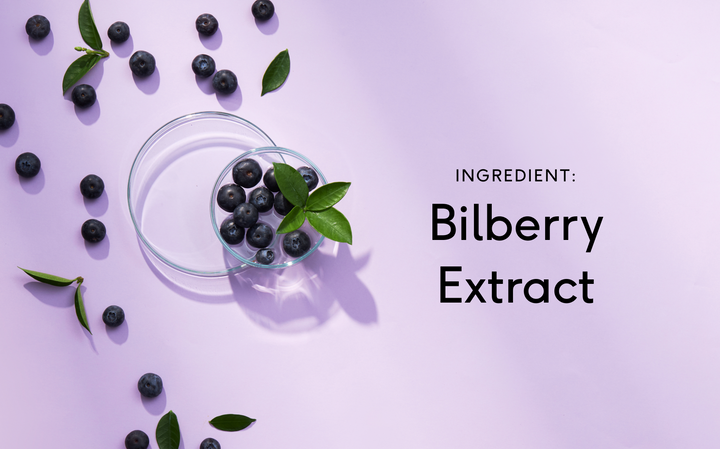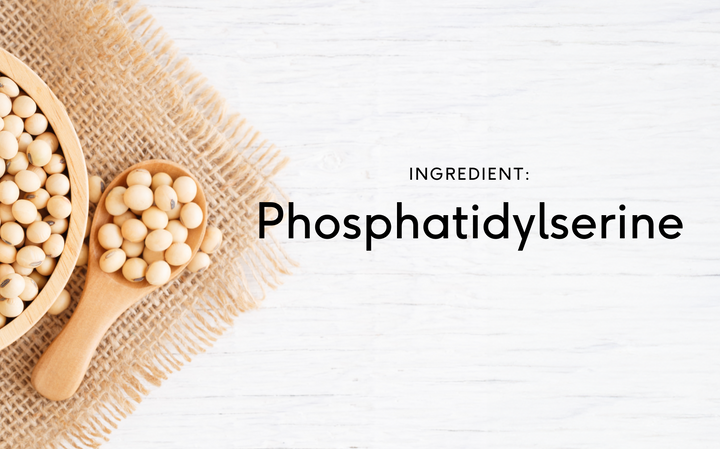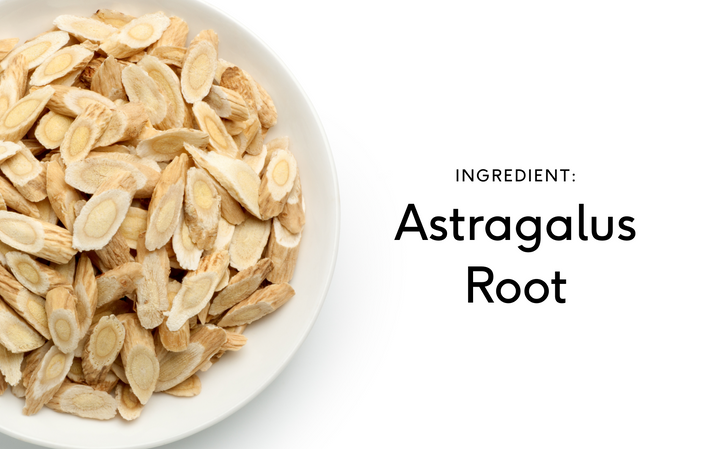Learn About L-Glutamine in 5 Minutes
Table of contents

What is L-glutamine?
L-glutamine is an essential amino acid your body needs to form proteins, and support immune and gastrointestinal health.
- Helps your body create new immune cells
- Keeps your gut healthy to boost digestion and improve your immune system
- Improves your ability to recover after exercise
- May prevent diabetes and reduce the symptoms of this disease
Why we love L-glutamine
L-glutamine is an essential amino acid, which means it helps your body build proteins. While D-glutamine doesn’t seem to do much in the body, L-glutamine has several beneficial effects. Your body produces L-glutamine, and you can get it in food. It’s easy to skimp on this important nutrient, however, which is why we included L-glutamine in Feel.
This amino acid boosts your immune system, helps you recover from exercise, and it may even prevent diabetes. Overall, ingesting plenty of L-glutamine provides your body with more proteins, which allows you to make new tissues and repair your cells.
L-Glutamine is thought to have benefits for several areas of the body, including digestion, immunity, and energy, whcih is why we've included 5mg in Feel Multivitamin.
Unbelievable benefits of L-glutamine
Scientists continue to research the benefits of getting plenty of L-glutamine in your diet. Here are some of the compellingly positive effects that this amino acid may have:
Immunological Benefits
Without L-glutamine, your body wouldn’t be able to make the immune cells it needs to protect you from dangerous invaders. This amino acid is a critical component of white blood cells and intestinal immune cells, so having more L-glutamine in your diet can increase your white blood cell count. Scientists have also found that your immune system might not work as well when you don’t consume enough L-glutamine.
Research indicates that L-glutamine improves overall health, and it also seems to improve survival rates in critically ill patients. You can help your body recover from surgery or injuries by supplementing with L-glutamine.
Diabetes Benefits
L-glutamine directly introduces glucose into the bloodstream, and it also increases your insulin levels. Low glucose and insulin levels are the central driving factors of diabetes, and increasing the levels of these important substances in your body can also reduce your risk of developing this disease.
Gastrointestinal Benefits
The gastrointestinal tract is the biggest part of your immune system, and maintaining healthy gut flora can protect you from all sorts of different diseases. L-glutamine provides nutrients to your immune cells, which helps the watchdog cells in your intestinal tract kill bad bacteria and promote the growth of good gut bacteria.
This amino acid also bolsters your intestinal barrier, which prevents leaky gut syndrome. When your gut is leaky, harmful bacteria can penetrate your gut and enter the rest of your body, so supplementing with L-glutamine can improve your overall ability to prevent illness.
Exercise Performance Benefits
Even though L-glutamine doesn’t appear to improve muscle gain, it does help your muscles recover after you exercise. Research indicates that supplementing with L-glutamine can reduce the length of muscle soreness after intensive exercise, and it also helps your muscle tissue recover.
Due to their intensive lifestyles, athletes are more at risk of getting sick, and illnesses can make athletes unable to do what they do best. Some studies suggest that L-glutamine improves the immune functioning of athletes.
Is L-glutamine water-soluble or fat-soluble?
L-glutamine is water-soluble, which means that your body absorbs it quickly, and it isn’t deposited in your organ tissues. However, L-glutamine does build up in your muscles, where it is used to make new muscle tissue
Where can L-glutamine be found naturally?
L-glutamine is most abundant in animal products; every type of meat contains L-glutamine. If you don't eat meat you can find L-glutamine in dairy products like cheese, yoghurt, and milk, beans, beets, brussels sprouts, kale, and a variety of other vegetables. However, vegetable sources of glutamine are far less rich in this amino acid, which makes L-glutamine supplementation necessary for people on animal-free diets
5 foods/drinks containing L-glutamine
- Seafood
- Red cabbage
- Natural yoghurt
- Beans
- Beets
What is the recommended daily intake for L-glutamine?
Relevant regulatory agencies, such as the National Institutes of Health (NIH), have not released recommended daily amount (RDA) data for L-glutamine. However, some authoritative sources suggest that approximately 5mg of L-glutamine per day is a safe and effective dose
Note: Data on the exact L-glutamine content of common food sources of this amino acid are not available
Can you absorb enough of L-glutamine from food?
It’s relatively easy to get enough L-glutamine from food if you eat meat every day. For people who don’t eat meat, however, it’s practically impossible to consume enough L-glutamine to support healthy immune, digestive, and muscular functioning. Therefore, vegans will need to take a capsule of Feel Multivitamin every day if they want to get enough L-glutamine in their diets.
Why is L-glutamine necessary for your body?
L-glutamine is a critical component of your immune system. Your body uses L-glutamine to make white blood cells and intestinal immune cells, and the immune cells in your digestive tract kill bad bacteria while promoting the growth of beneficial bacteria and other microorganisms. L-glutamine also plays a key role in muscle growth and recovery.
Functions of L-glutamine
Immune functions: This amino acid improves the action of your immune system by promoting the growth of white blood cells and other immune cells.
Digestive functions: L-glutamine aids in digestion by preventing the growth of bad bacteria.
Muscle functions: This amino acid helps create muscle proteins, which speeds up exercise recovery and helps produce new muscle tissue.
Diabetes functions: L-glutamine directly adds glucose to your blood, and it also increases your levels of insulin, which fights back against the primary symptoms of diabetes.
Symptoms of L-glutamine deficiency
Sudden Weight Loss
L-glutamine is critically involved in your digestive function, and without it, your body can’t produce enough digestive enzymes or support beneficial digestive bacteria. As a result, L-glutamine deficiency can cause changes in bowel movements and sudden drops in body mass
Persistent Fatigue
Since your muscles use L-glutamine to make new tissue, deficiency in this amino acid could result in muscle weakness and fatigue. Rather than causing trouble staying awake, L-glutamine deficiency can make it harder to articulate your limbs and move around throughout the day
Increased Illness
Since L-glutamine is critically involved in the production of immune cells, a deficiency in this essential amino acid could result in frequent illness and increased susceptibility to various types of infections
How long do you need to take L-glutamine to start experiencing its benefits?
In most cases, you can note the effects of L-glutamine supplementation immediately. Since this substance is stored in your muscles and used gradually, it may take some time to experience the benefits of L-glutamine.
Consistency is key and our research recommends taking your Feel supplements for at least 3 months to allow your body to adjust and provide the desired benefits.
How long does it take for your body to digest/absorb L-glutamine?
Authoritative data on L-glutamine absorption rates have yet to be established. However, some sources suggest that the vast majority of L-glutamine ingested over a 24-hour period remains present in the body; only small amounts of this amino acid are excreted in urine within this time period.
How long does L-glutamine stay in your body after you take it?
It’s unclear exactly how long L-glutamine remains in your body after digestion. While this substance is water-soluble, which means it is excreted relatively quickly, it is also stored and used in your muscles. It’s reasonable to assume that a large portion of this amino acid is excreted within 48-72 hours, but the remaining portion stays in your muscles where it is used to produce new muscle tissue.
Is L-glutamine an antioxidant?
L-glutamine appears to reduce oxidative stress in diabetic individuals. This amino acid is an immune modulator, which means it supports the healthy functioning of the immune system. While L-glutamine is not a direct antioxidant, it appears to exert antioxidant properties by helping the immune system reduce oxidative stress.
Can you overdose on L-glutamine? What are the effects?
It’s typically recommended that you avoid consuming more than 30g of L-glutamine per day. While L-glutamine overdose symptoms are not life-threatening, they may include nausea, vomiting, diarrhoea, and excessive urination as your body works to return your L-glutamine content to normal levels.
Does L-glutamine dissolve, flush out, or build up in the body?
L-glutamine only builds up in your muscular tissues; any other L-glutamine used in your gut or immune system is excreted after use.
Can you take L-glutamine during a diet?
The ingestion of L-glutamine does not interfere with any dietary considerations. In fact, making sure to ingest L-glutamine while you’re on a diet can improve your ability to absorb nutrients.
Since L-glutamine is primarily available in animal-based food sources, individuals who don’t eat animal products may have trouble sourcing L-glutamine from food. L-glutamine supplements like Feel Multivitamin, however, are safe, bioavailable, and vegan-friendly.
Are there synthetic forms of L-glutamine?
L-glutamine is the most popular synthetic form of this nutrient. Most forms of supplemental L-glutamine are synthetic.
Why might synthetic forms of L-glutamine be better?
Synthetic L-glutamine is inexpensive to produce, and it appears to have the same effects as natural forms of this amino acid.
Absorption rate of synthetic L-glutamine
While authoritative absorption rate data for L-glutamine are not available, it’s reasonable to assume that natural and synthetic L-glutamine have similar absorption rates since they are chemically identical.
Why might natural forms of L-glutamine be better?
Natural forms of L-glutamine may taste better than synthetic forms of this amino acid. Otherwise, there are no apparent benefits of natural L-glutamine.
How to take L-glutamine
You can consume L-glutamine in food, as a powdered food and drink additive, or as an oral supplement.
L-glutamine trends in medicine
Research continues to be done into the sports nutrition benefits of L-glutamine. In 2019, a study was published supporting the anti-fatigue benefits of this essential amino acid. Additionally, a study was recently carried out to determine the body mass benefits of administering L-glutamine to chicks in meat production applications. The facilitators of this study determined that chicks fed L-glutamine attained greater body mass than the control group.
Why everyone should be taking WeAreFeel supplements
Whether you exercise frequently or not, L-glutamine is essential to your overall health and well-being. More and more, it’s becoming clear that your gut health is directly tied to your overall wellness; your gut is where all the nutrients you consume are processed, and without optimal gut health, your susceptibility to low energy levels and disease increases.
Here at WeAreFeel, we’re pioneering the next generation of supplements, and with 5mg of L-glutamine in every capsule of Feel, we provide you with the exact dose of this amino acid that the latest studies indicate as being ideal for immune, digestive, and muscular function. Especially if you’re on an animal-free diet or you’re too busy to make sure you get three square meals per day, supplementing with Feel is the best way to get the L-glutamine you need to avoid illness and stay active!
Here’s the Proof
- Nutrition, Anabolism, and the Wound Healing Process: An Overview
- L-glutamine and the immune system.
- The effect of intravenous alanyl-glutamine supplementation on plasma glutathione levels in intensive care unit trauma patients receiving enteral nutrition: the results of a randomised controlled trial.
- A randomised cross-over study of the metabolic and hormonal responses following two preoperative conditioning drinks.
- L-glutamine as an immunonutrient.
- L-glutamine and intestinal barrier function.
- L-glutamine: an essential amino acid for the gut.
- The Influence of Oral L-Glutamine Supplementation on Muscle Strength Recovery and Soreness Following Unilateral Knee Extension Eccentric Exercise.
- L-glutamine supplementation and immune function during heavy load training.




















































 Back
Back





